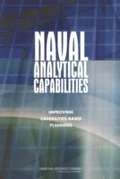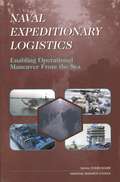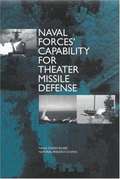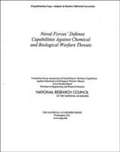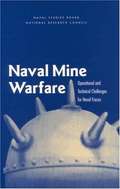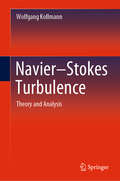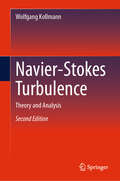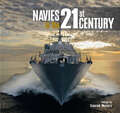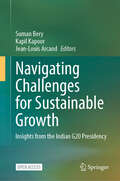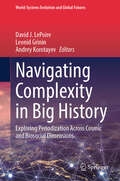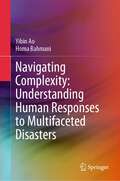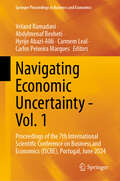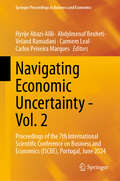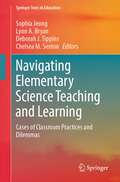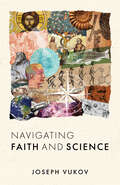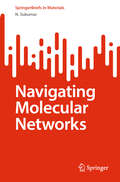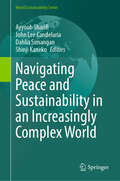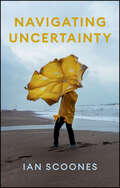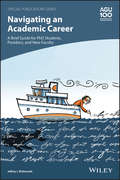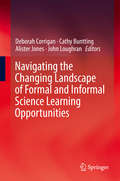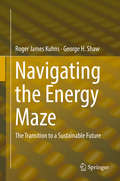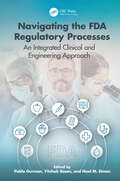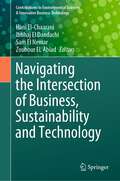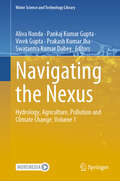- Table View
- List View
Naval Analytical Capabilities: Improving Capabilities-based Planning
by National Research Council of the National AcademiesThe National Academies Press (NAP)--publisher for the National Academies--publishes more than 200 books a year offering the most authoritative views, definitive information, and groundbreaking recommendations on a wide range of topics in science, engineering, and health. Our books are unique in that they are authored by the nation's leading experts in every scientific field.
Naval Expeditionary Logistics: Enabling Operational Maneuver From the Sea
by National Research CouncilInformation on Naval Expeditionary Logistics
Naval Forces' Capability For Theater Missile Defense
by Institute of Medicien National Academy of Science National Academy of EnegineeringA report on the Naval Forces' Capability For Theater Missile Defense
Naval Forces' Defense Capabilities Against Chemical and Biological Warfare Threats
by Committee for an Assessment of Naval Forces' Defense Capabilities Against Chemical Biological Warfare ThreatsThis book reviews a draft report from the federal government that assesses the effects of oxygenated gasoline on public health, air quality, fuel economy, engine performance, and water quality. In addition to evaluating the scientific basis of the report, the book identifies research needed to better understand the impacts of oxygenated fuels. Methyl tertiary-butyl ether (MTBE), which is intended to reduce carbon monoxide pollution during winter, is the most commonly used additive in the federal oxygenated fuels program. MTBE has been implicated in complaints by the public of headaches, coughs, and nausea. Other questions have been raised about reduced fuel economy and engine performance and pollution of ground water due to the use of MTBE in gasoline. The book provides conclusions and recommendations about each major topic addressed in the government's report.
Naval Mine Warfare: Operational and Technical Challenges for Naval Forces
by Committee for Mine Warfare AssessmentA report on the Operational and Technical Challenges for Naval Forces
Navier-Stokes Turbulence: Theory and Analysis
by Wolfgang KollmannThe book serves as a core text for graduate courses in advanced fluid mechanics and applied science. It consists of two parts. The first provides an introduction and general theory of fully developed turbulence, where treatment of turbulence is based on the linear functional equation derived by E. Hopf governing the characteristic functional that determines the statistical properties of a turbulent flow. In this section, Professor Kollmann explains how the theory is built on divergence free Schauder bases for the phase space of the turbulent flow and the space of argument vector fields for the characteristic functional. Subsequent chapters are devoted to mapping methods, homogeneous turbulence based upon the hypotheses of Kolmogorov and Onsager, intermittency, structural features of turbulent shear flows and their recognition.
Navier-Stokes Turbulence: Theory and Analysis
by Wolfgang KollmannThis updated/augmented second edition retains it class-tested content and pedagogy as a core text for graduate courses in advanced fluid mechanics and applied science. The new edition adds revised sections, clarification, problems, and chapter extensions including a rewritten section on Schauder bases for turbulent pipe flow, coverage of Cantwell’s mixing length closure for turbulent pipe flow, and a section on the variational Hessian. Consisting of two parts, the first provides an introduction and general theory of fully developed turbulence, where treatment of turbulence is based on the linear functional equation derived by E. Hopf governing the characteristic functional that determines the statistical properties of a turbulent flow. In this section, Professor Kollmann explains how the theory is built on divergence free Schauder bases for the phase space of the turbulent flow and the space of argument vector fields for the characteristic functional. The second segment, presented over subsequent chapters, is devoted to mapping methods, homogeneous turbulence based upon the hypotheses of Kolmogorov and Onsager, intermittency, structural features of turbulent shear flows and their recognition.
Navier-Stokes-Fourier Equations
by Radyadour Kh. ZeytounianThis research monograph deals with a modeling theory of the system of Navier-Stokes-Fourier equations for a Newtonian fluid governing a compressible viscous and heat conducting flows. The main objective is threefold. First , to 'deconstruct' this Navier-Stokes-Fourier system in order to unify the puzzle of the various partial simplified approximate models used in Newtonian Classical Fluid Dynamics and this, first facet, have obviously a challenging approach and a very important pedagogic impact on the university education. The second facet of the main objective is to outline a rational consistent asymptotic/mathematical theory of the of fluid flows modeling on the basis of a typical Navier-Stokes-Fourier initial and boundary value problem. The third facet is devoted to an illustration of our rational asymptotic/mathematical modeling theory for various technological and geophysical stiff problems from: aerodynamics, thermal and thermocapillary convections and also meteofluid dynamics.
Navies in the 21st Century
by Conrad Waters&“A range of naval experts . . . build[s] a diverse and deeply-thought out picture of where maritime warfare is now and where it is likely to go.&”—Army Rumour Service What is the purpose of navies in the modern world, and what types of warship does this require? This book tackles these questions by looking at naval developments, both technological and operational, in the quarter century since the end of the Cold War. It provides the overall political and economic context, assesses significant naval operations from the first Gulf War to Russia&’s annexation of Crimea, reviews changes in the objectives and composition of the principal fleets, describes major design developments amongst the main warship types, and examines wider technological and operational developments, including naval aviation, shipbuilding and manning. &“A high quality publication with a great many superb photographs. For those wishing to keep fully informed on world naval affairs, it is excellent value and strongly recommended.&”—Scuttlebutt &“This new book follows the successful approach and format of the very popular naval annual Seaforth&’s World Naval Review. Under the same editor, a new team of specialists have been assembled to write authoritative articles in their particular fields of expertise. The absorbing text is fully supported by many outstanding images—Most Recommended.&”—Firetrench &“Provides a most useful contextual analysis of the post-Cold War period, explaining how technological developments and a range of world events have variously shaped the fleets of today.&”—Warship
Navigating Challenges for Sustainable Growth: Insights from the Indian G20 Presidency
by Suman Bery Kapil Kapoor Jean-Louis ArcandThe open access volume stems from a conference held during the Indian G20 Presidency in New Delhi on 28-29 July 2023, featuring 40 leading experts from 14 countries across the world. It addresses issues, such as climate adaptation, global health, technology, and financial investments. It discusses India's transition to net-zero emissions, the dynamics of technological disruptions, the shift towards a unified digital economy, and the transformations in the global economy. It critically analyzes the global financial architecture, the evolving nature of capital and the job market, and the complex interplay between economics, politics, and global health. It also discusses the uneven progress in international development, focusing on Africa's unique challenges and potentials. With expert contributions across sectors, including policy, academia, and industry, the volume provides cross-cutting insights that resonate with multiple stakeholders and offer pragmatic agendas for a sustainable future. This book stands as a crucial resource for anyone keen on understanding or influencing sustainable growth on a global scale.
Navigating Complexity in Big History: Exploring Periodization Across Cosmic and Biosocial Dimensions (World-Systems Evolution and Global Futures)
by Leonid Grinin Andrey Korotayev David J. LePoireThis book explores periodization in Big History against the background of complexity growth across the Universe, on our planet, and in biological, social, and cultural systems. It traces the accelerating rise in complexity throughout history and the major historical transformations involved in the evolution of life, humans, and civilization. It draws on concepts from physics and evolutionary biology to offer potential models of the underlying mechanisms driving this acceleration, along with potential clues to how it might end. In the editors&’ introduction (Chapter 1), the effort to periodize is placed within the historical context along with considerations from complexity science. Subsequent chapters explore various aspects of periodization and complexity by (a) identifying symmetrical cosmic and biosocial trends, (b) testing rigor and criteria for evaluating periodization, (c) attempting to integrate different approaches through multiple perspectives, (d) proposing different strategies for determining geometric patterns in terrestrial bio-social evolution, and (e) applying the traditional threshold model to gain insights into possible future pathways. A concluding chapter identifies commonalities, research gaps, and possible approaches to integration as the current state of the world system rapidly evolves, while also offering a deeper understanding of complexity dynamics and historical processes. Each chapter includes an extensive bibliography, allowing a deeper and more detailed examination of the issues covered.
Navigating Complexity: Understanding Human Responses to Multifaceted Disasters
by Yibin Ao Homa BahmaniThis thought-provoking book unravels the intricate interplay between human behavior and disasters, weaving a rich narrative that transcends traditional boundaries. Embark on a captivating exploration of human responses to multifaceted disasters with this book. Unveiling the human psyche and the intricate web of emotions that intertwine with disaster events, this book offers a profound understanding of human responses to multifaceted disasters.Written with precision and meticulous research, this book captivates scholars, practitioners, and policymakers alike. Its multidimensional perspectives offer valuable insights for disaster management, urban planning, sociology, and public health, transcending disciplinary boundaries.
Navigating Economic Uncertainty - Vol. 1: Proceedings of the 7th International Scientific Conference on Business and Economics (ISCBE), Portugal, June 2024 (Springer Proceedings in Business and Economics)
by Veland Ramadani Abdylmenaf Bexheti Hyrije Abazi-Alili Carmem Leal Carlos Peixeira MarquesThis book is the first volume presenting carefully selected chapters from the proceedings of the 7th International Scientific Conference on Business and Economics (ISCBE), Vila Real, Portugal, which took place in June 2024. The chapters provide key strategies for thriving in the midst of economic turbulence and explore adaptation, innovation, and resilience in our modern, unpredictable landscape. They cover a wide range of areas relevant to contemporary business and economics issues such as economic shocks, high inflation, energy crisis, growth prospects, economic forecast, labor market, gender inequalities, migration, entrepreneurship, firm development and innovations, and technological transformation. The book is an essential compass for business leaders to navigate market volatility and economic uncertainty.
Navigating Economic Uncertainty - Vol. 2: Proceedings of the 7th International Scientific Conference on Business and Economics (ISCBE), Portugal, June 2024 (Springer Proceedings in Business and Economics)
by Veland Ramadani Abdylmenaf Bexheti Hyrije Abazi-Alili Carmem Leal Carlos Peixeira MarquesThis book is the second volume presenting carefully selected chapters from the proceedings of the 7th International Scientific Conference on Business and Economics (ISCBE),Vila Real, Portugal, which took place in June 2024. The chapters provide key strategies for thriving in the midst of economic turbulence and explore adaptation, innovation and resilience in our modern, unpredictable landscape. They cover a wide range of areas relevant to contemporary business and economics issues such as economic shocks, high inflation, energy crisis, growth prospects, economic forecast, labor market, gender inequalities, migration, entrepreneurship, firm development and innovations, and technological transformation. The book is an essential compass for business leaders to navigate market volatility and economic uncertainty.
Navigating Elementary Science Teaching and Learning: Cases of Classroom Practices and Dilemmas (Springer Texts in Education)
by Deborah J. Tippins Sophia Jeong Lynn A. Bryan Chelsea M. SextonThis book is a resource for both prospective and practicing elementary teachers as they learn to teach science in ways which foster the development of a community of science learners with multiple perspectives and diverse approaches to problem solving. It includes cases that feature dilemmas embedded in rich narrative stories which characterize the lives of teachers of science, and by extension their students, and serve as tools for discussion, critique, and reflective practice. The introduction to the book explores changing contexts for elementary science teaching and learning, and describes how case-based pedagogy can be used as a tool for both instruction and research. Each subsequent section of the book includes cases that are organized around topics such as contemporary approaches to teaching elementary science, new roles for technology, and the creation of inclusive learning environments for all students in elementary science. Each case is followed by reflective commentaries and concludes with questions for reflection and discussion. Teachers will benefit from these cases as they explore the complexities and ambiguities of elementary science teaching and learning in today’s classrooms.
Navigating Faith and Science
by Joseph VukovReligious belief is often perceived as being in conflict with science—but does it have to be? Not usually, says Joseph Vukov. In this short, accessible guide, Vukov advances three models for Christians to utilize when navigating the relationship between science and faith: conflict, independence, and dialogue. He argues that dialogue is the ideal model to follow most of the time—but not necessarily all the time. Through a philosophical approach grounded in compelling real-world examples, Vukov shows how no single model can be universally adequate, and how Christians must proceed with discernment according to the nature of the matter at hand. Considering a wide variety of illustrative issues—including cosmology, evolutionary biology, extraterrestrial life, miracles, brain death, and theoretical physics—Vukov introduces and describes each of the three models of interaction between faith and science, surveys their applications, and evaluates the effectiveness of each. Throughout, he encourages Christians to embrace a spirit of intellectual humility and remember that, at their best, faith and science converge in their relentless human pursuit of truth.
Navigating Molecular Networks (SpringerBriefs in Materials)
by N. SukumarThis book delves into the foundational principles governing the treatment of molecular networks and "chemical space"—the comprehensive domain encompassing all physically achievable molecules—from the perspectives of vector space, graph theory, and data science. It explores similarity kernels, network measures, spectral graph theory, and random matrix theory, weaving intriguing connections between these diverse subjects. Notably, it emphasizes the visualization of molecular networks. The exploration continues by delving into contemporary generative deep learning models, increasingly pivotal in the pursuit of new materials possessing specific properties, showcasing some of the most compelling advancements in this field. Concluding with a discussion on the meanings of discovery, creativity, and the role of artificial intelligence (AI) therein.Its primary audience comprises senior undergraduate and graduate students specializing in physics, chemistry, and materials science. Additionally, it caters to those interested in the potential transformation of material discovery through computational, network, AI, and machine learning (ML) methodologies.
Navigating Peace and Sustainability in an Increasingly Complex World (World Sustainability Series)
by Shinji Kaneko Ayyoob Sharifi Dahlia Simangan John Lee CandelariaThis book, a sequel to a well-received book titled “Bridging Peace and Sustainability Amidst Global Transformations,” delves deeper into the entwined roots of peace and sustainability and emphasizes their interdependence. How are peace and sustainability interconnected, and what key factors define the relationship between them? These questions were examined at the NERPS 2024 conference in Hiroshima and are central to our narrative. In this book, we explore the synergy of peace and sustainability through theoretical frameworks and real-world examples.We recognize that while the 2030 Agenda for Sustainable Development has acknowledged the link between peace and sustainability, a significant gap remains. Too often, efforts to promote peace and sustainability run parallel, never intertwining, losing the chance to bolster each other. We argue for merging the peace and sustainability agendas to confront contemporary challenges, calling for action to enhance and take advantage of their mutual reinforcement. Through diverse perspectives, this collection illuminates the social, economic, and environmental dimensions of this nexus, serving as a guide for policymakers, a reference for researchers, and a catalyst for dialogue among sectors committed to achieving the Sustainable Development Goals.
Navigating Uncertainty: Radical Rethinking for a Turbulent World
by Ian ScoonesUncertainties are everywhere. Whether it’s climate change, financial volatility, pandemic outbreaks or new technologies, we don’t know what the future will hold. For many contemporary challenges, navigating uncertainty – where we cannot predict what may happen – is essential and, as the book explores, this is much more than just managing risk. But how is this done, and what can we learn from different contexts about responding to and living with uncertainty? Indeed, what might it mean to live from uncertainty?Drawing on experiences from across the world, the chapters in this book explore finance and banking, technology regulation, critical infrastructures, pandemics, natural disasters and climate change. Each chapter contrasts an approach centred on risk and control, where we assume we know about and can manage the future, with one that is more flexible, responding to uncertainty. The book argues that we need to adjust our modernist, controlling view and to develop new approaches, including some reclaimed and adapted from previous times or different cultures. This requires a radical rethinking of policies, institutions and practices for successfully navigating uncertainties in an increasingly turbulent world.
Navigating an Academic Career: A Brief Guide For Phd Students, Postdocs, And New Faculty (Special Publications #74)
by Jeffrey J. McDonnellDemystifies the academic career path with practical advice With the number of people being awarded PhDs growing far more rapidly than the supply of academic jobs, those at an early-career stage must think strategically in order to be competitive and successful. Navigating an Academic Career: A Brief Guide for PhD students, Post docs, and New Faculty is a concise and conversational manual that guides readers through starting their academic journey, surviving the demands of their first academic position, and thriving in academia and beyond. Volume highlights include: Firsthand perspective on the characteristics of a successful academic Guidance on interviewing, negotiating, branding, and other essential soft skills Tips for effective time management and writing high-impact research papers Insights into developing leadership skills and mentoring others The American Geophysical Union promotes discovery in Earth and space science for the benefit of humanity. Its publications disseminate scientific knowledge and provide resources for researchers, students, and professionals.
Navigating the Changing Landscape of Formal and Informal Science Learning Opportunities
by John Loughran Alister Jones Cathy Buntting Deborah CorriganThis book presents research involving learning opportunities that are afforded to learners of science when the focus is on linking the formal and informal science education sectors. It uses the metaphor of a "landscape" as it emphasises how the authors see the possible movement within a landscape that is inclusive of formal, informal and free-choice opportunities. The book explores opportunities to change formal school science education via perspectives and achievements from the informal and free-choice science education sector within the wider lifelong, life-wide education landscape. Additionally it explores how science learning that occurs in a more inclusive landscape can demonstrate the potential power of these opportunities to address issues of relevance and engagement that currently plague the learning of science in school settings. Combining specific contexts, case studies and more general examples, the book examines the science learning landscapes by means of the lens of an ecosystem and the case of the Synergies longitudinal research project. It explores the relationships between school and museum, and relates the lessons learned through encounters with a narwhal. It discusses science communication, school-community partnerships, socioscientific issues, outreach education, digital platforms and the notion of a learning ecology.
Navigating the Energy Maze
by George H. Shaw Roger James KuhnsThis book presents essential information for the development of a comprehensive sustainable energy policy. It examines the diverse types of energy, their resource abundance and the material needs to develop and use them, and how communities and cities can better control their own destinies by locally managing energy use and generation. This approach does not suggest the undoing of existing infrastructures and energy providers, but rather a cooperative transition from national-regional energy management to a more local-centered system. The information is the foundation for eight specific legislative initiatives necessary for a national comprehensive sustainable policy that can both facilitate and drive the process of evolution from a carbon-energy economy to a sustainable renewable energy future.
Navigating the FDA Regulatory Processes: An Integrated Clinical and Engineering Approach
by Pablo Gurman, Yitzhak Rosen, and Noel M. ElmanThis book provides a unique knowledge source of the FDA’s regulatory processes to anyone interested in the development and approval of biomedical products.Navigating the FDA Regulatory Processes will be of particular importance for those innovating in biomedical devices, pharmacological therapies, and combination products, who are interested in considering regulatory affairs early on in product development. The authors offer a comprehensive exploration of FDA regulations, providing industry insights and guidance for navigating the complexities of drug and device development. The book offers concrete examples, industry perspectives, and historical context, ensuring clarity and aiding in successful understanding of the requirements for regulatory compliance. Readers will also gain a thorough understanding of FDA regulatory processes, from securing approvals to navigating expedited pathways. Lastly, the book provides unique insights into the FDA approach for emergency preparedness, including discussing the recent COVID-19 pandemic.Biomedical industry personnel, engineers, scientists, entrepreneurs, medical doctors, students, and anyone interested in the development and approval of medical products in the US will find this book useful and essential.
Navigating the Intersection of Business, Sustainability and Technology (Contributions to Environmental Sciences & Innovative Business Technology)
by Hani El-Chaarani Ibtihaj El Dandachi Sam El Nemar Zouhour El AbiadIn today's world, businesses are increasingly recognizing the importance of sustainability and technology as essential components of their operations. This book offers a comprehensive guide to help you navigate the complexities of the interconnected areas of business, sustainability and technology. The book further shows how sustainability and technology are transforming the business landscape and how they can harness their power to drive innovation, create value and achieve long-term success. Drawing on the latest research and real-world case studies, the book provides practical insights and strategies that readers can use to navigate this rapidly changing landscape. The book further offers a comprehensive roadmap to navigate the intersection of business, sustainability and technology, including developing sustainable business models and cutting-edge technologies such as artificial intelligence and blockchain. This book is an essential resource for business leaders, entrepreneurs, investors and students.
Navigating the Nexus: Hydrology, Agriculture, Pollution and Climate Change, Volume 1 (Water Science and Technology Library #102)
by Pankaj Kumar Gupta Swatantra Kumar Dubey Prakash Kumar Jha Aliva Nanda Vivek GuptaThis book encompasses updated information as well as future directions for researchers working in the fields of environmental science, water resource engineering, and agricultural science. Navigating the Nexus: Hydrology, Agriculture, Pollution, and Climate Change focuses on the thematic areas of water resource, agriculture, and environmental domains. This book covers advances in modelling approaches, including Machine Learning (ML)/Artificial Intelligence (AI) applications; GIS and remote sensing; and sensors; to provide hydrological, agricultural, and environmental solutions during the ongoing climate crisis.
